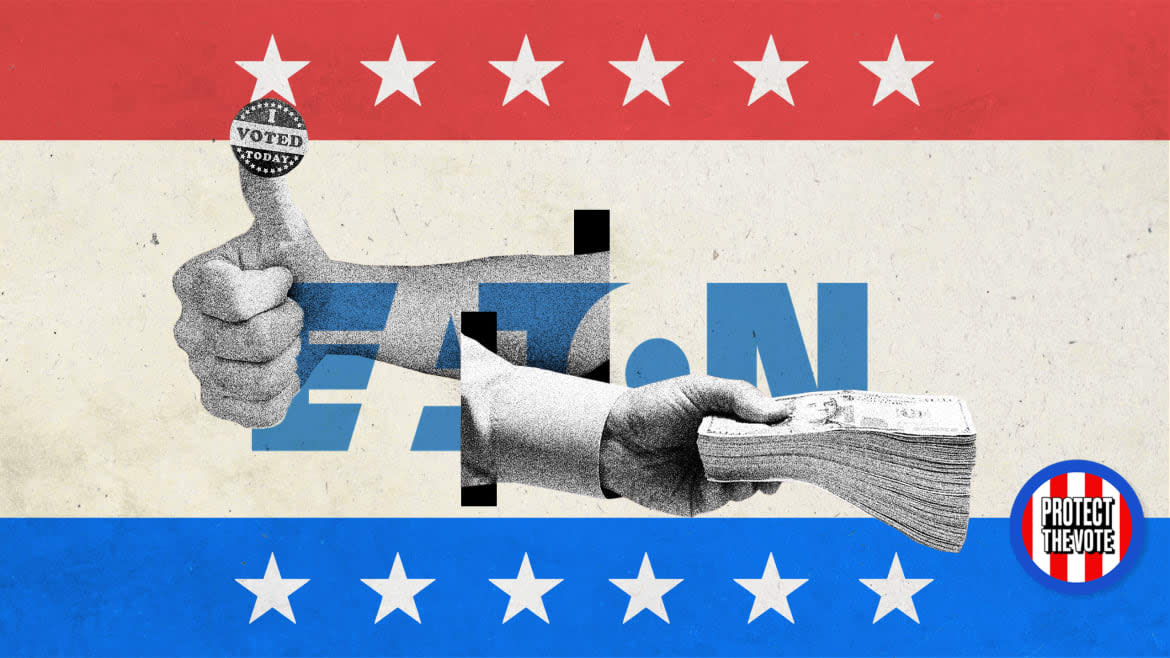Company Praised Voting Rights, but Handed $1.6B to Right-Wingers

- Oops!Something went wrong.Please try again later.
Last year, publicly traded Eaton signed an open statement championing “American democracy” and acknowledging the country’s history of political disenfranchisement. “We all should feel a responsibility to defend the right to vote and to oppose any discriminatory legislation or measures that restrict or prevent any eligible voter from having an equal and fair opportunity to cast a ballot,” read the statement, which ran in newspapers including The New York Times and The Washington Post.
But just one month prior, the power company handed $1.6 billion to a trust controlled by a man whose work has allegedly run counter to those values. That individual, Leonard Leo, is perhaps best known for his efforts to pack courts with conservative judges. He has also been linked to groups like the Honest Elections Project, which has been accused of pushing for controversial new voting restrictions, supposedly in the name of electoral security.
Details of Leo’s role at the trust only came to light this week, following reports in The New York Times and ProPublica.
“I think that Leonard Leo's work, especially his recent work in terms of voting, has been quite damaging to American democracy,” said Richard Hasen, a professor who specializes in election law and campaign finance regulation at the UCLA School of Law. “And I think that with an extra $1.6 billion to play with there’s a lot more damage that can be done.”
The $1.6 billion infusion came about through a complex maneuver, in which conservative billionaire Barre Seid donated shares in his manufacturing business to the Marble Freedom Trust, helmed by Leo. Marble then sold the company to Eaton for more than $1.6 billion in March 2021.
In press releases announcing the acquisition, Eaton made no mention of the trust or Leo. In Hasen’s view, it’s possible the company didn’t know their money would “help fund Leonard Leo’s empire,” given that he isn’t a household name. In that case, he said, it would be “hard to fault them.”
New Right-Wing Megadonor Barre Seid Has Sparked Huge Controversy Before
Maurice Cunningham, an associate professor of political science at Boston University who writes about secretive political spending known as “dark money,” was skeptical Eaton could have been ignorant about the beneficiary of its funds.
“I don't buy for a minute that a $1.6 billion [deal] is made without knowing where it's going and who's going to use it and what their track record is,” he said.
“Eaton has some explaining to do. Do they support American democracy or was it all just talk to get some good PR?” added Kyle Herrig, president of Accountable.US, which describes itself as a nonpartisan organization aiming to “shine a light on corporations and special interests that too often wield unchecked power and influence.”
Leo did not respond to a request for comment. A spokesperson for Eaton said, “We have no additional information to share regarding the acquisition that was announced last year.”
In a statement, Honest Elections Project executive director Jason Snead said the group “is proud to support the right to vote in free and fair elections and defend the commonsense laws that Americans overwhelmingly demand to safeguard our election system…including photo ID, access to early voting, and clean voter rolls.”
Snead has previously distanced the group from some of former President Donald Trump’s election fraud conspiracy theories. “We looked very carefully at all the allegations that were coming out after the election,” he told the Associated Press last year. “We concluded, as did a lot of other folks, that there was no evidence of widespread fraud.”
However, in the run-up to the vote, the Honest Elections Project was accused of fomenting panic about mail-in voting and so-called voter fraud, including through a reported $250,000 ad blitz about attempts “to manipulate the election.” As The Guardian previously noted, in 2019 the group published a blog declaring voter suppression a “myth.”
Hasen publicly assailed Leo’s work with the Honest Elections Project in 2020, declaring on Twitter that it was “advancing crackpot theories which could be used to try to get the courts, which he helped to stack with conservatives, to accept sham voter fraud arguments which could affect voting outcomes.”
Despite the blowback, Barre’s gift—and Eaton’s subsequent acquisition—could become a new model for political spending, since it allowed both the billionaire and the trust to avoid paying taxes on the deal. Not to mention, for more than a year the entire affair remained a secret.
Get the Daily Beast's biggest scoops and scandals delivered right to your inbox. Sign up now.
Stay informed and gain unlimited access to the Daily Beast's unmatched reporting. Subscribe now.

